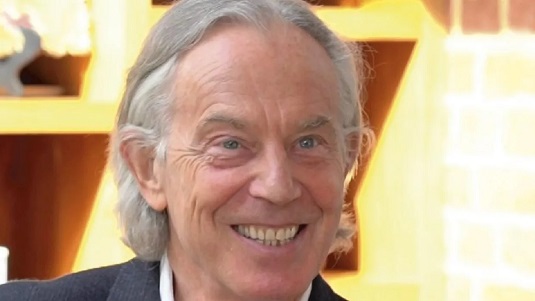Arise Sir Tony

There is a concerted establishment effort to launder Blair and absolve him of his pivotal role in the Iraq War. As he likes to say, he's proud of the fact he helped topple a repulsive dictator. One, we should remember, the Anglo-American alliance were very happy to support until Saddam Hussein slipped his leash. But the question is what is a reasonable blood price for regime change? Not only are there the hundreds of thousands killed directly by military assault and a decade's worth of sanctions, but we also have the warlordism and the rise (and fall) of ISIS. A bleak catalogue of appalling devastation and death that, in all likelihood, would not have happened if Blair hadn't provided George W Bush the political cover his Middle Eastern adventure needed. But it's okay, those affected by his actions seldom if ever come into his orbit. He doesn't have to sit across a dinner table from an Iraqi, whose family's bodies laid for months in the rubble of their home. One unforeseen political consequence was how Blair's decision has limited subsequent governments' room for manoeuvre. The invasion of Libya happened, bombs were dropped in Syria, the RAF are active, if largely unreported, participants in Saudi Arabia's war in Yemen, but undoubtedly there would have been less jaw jaw and more war war were it not for the disaster visited on Iraq and the exposure of the lies that justified it. For providing such a drag on Britain's ability to make war, it's a wonder the establishment are patting him on the head.
But, lest we forget, there was more to Blair than a war of dubious legality and humanitarian provenance. While no one seriously thought his 1997 government was going to imperil capital and unleash the Marxist hounds of hell, his 10 years in power bedded down rather than unpicked the Thatcherite settlement. Only Labour politicians are daft enough to treat neoliberal macroeconomics as articles of faith, but time and again government intervention in the economy was ruled out. Except for when the state was selling off what bits of the public infrastructure the Tories didn't get round to, or creating new market opportunities (mainly outsourcing) in public services and the NHS. On this score, John Major drew up the blueprints and Blair's governments took over and made their own. The Private Finance Initiative, faux competition between state-run services, expanding neoliberal governance, all provided capital with guaranteed public sums and the residual class consciousness befitting a period of class peace. Profits were up, employment was up, public amenities got a lick of paint, and pleasingly the collective power of the working class declined over the Blair and Brown period. For a party of the trade unions, they did everything they could - and then some - to prevent the re-emergence of a collective or collectivist consciousness. A point underlined by the Iraq War protests, which were overwhelmingly pacifistic and found their protest vote outlet in ... the Liberal Democrats.
Apart from services rendered to capital and tradition, there is a very personal reason why the Queen might decorate Blair in this way. On 31st August, 1997, Princess Diana met her untimely end in a Parisian tunnel. That morning a hesitant and borderline choked Tony Blair dubbed her the 'People's Princess' - an oxymoron if there ever was one - but a tribute that certainly caught the mood. Who was out of step with public feeling was the Windsor firm. As Diana was an arm's length exile from court, the stuffy institution paralysed by protocol and inflexibility did not have the wherewithal to respond to the outpouring of popular grief. Indeed, The Sun launched a campaign to get the Queen to fly the flag atop Buckingham Palace at half mast. The visible distance and refusal to respond might easily have spilled over into a terminal crisis for the monarchy. Remember, it had been plagued by scandal, leaks, and its legitimacy was under some pressure. But, to put no finer point on it, Blair saw it his duty to intervene to support it. He urged the Queen to appear in public while the machinery of government swung into action. There was inescapable wall-to-wall coverage, public events and normal TV and radio programming cancelled, and the emotional fervour it fanned originally settled on the perceived need to protect Diana's boys, before expanding to the rest of the front rank royals. Within a year the kind of press the Windsors had early in the decade was a memory.
Blair knew his hip, vague brand of modernising changey-progressivism, which counted for little when it came down to it, potentially sat uneasily with Britain's own hide bound and creaking peculiar institution. Embarking on his own programme of constitutional reform with the devolution referenda, he chose to embrace the monarchy, give it good PR and a soupçon of humility, and align it - the thousand year old symbol of national continuity - with his flash-in-the-plan project for a "young country". Whether Blair received political blessings at the time for his obsequious efforts is a matter of debate, though it doesn't seem to have done his ratings any harm. However, while he helped the monarchy get a nip and a tuck, its long-term popular legitimacy appears to be eroding again - if the mass indifference that greeted Prince Philip's funeral is anything to go by.
This is now and that was then. Blair bought the Queen valuable time, time enough for a toned down Prince Charles and a thoroughly modern Prince William to embed themselves in popular consciousness. Just don't talk about the rebellious royals or, cough cough, Prince Andrew. By royal decree, Blair has his just reward in time to see how, in the long run, his efforts at saving the monarchy are unravelling.
Image Credit